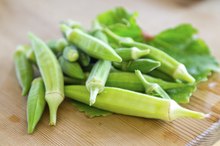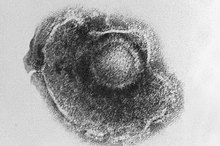What does fact checked mean?
At Healthfully, we strive to deliver objective content that is accurate and up-to-date. Our team periodically reviews articles in order to ensure content quality. The sources cited below consist of evidence from peer-reviewed journals, prominent medical organizations, academic associations, and government data.
- National Center for Biotechnology Information: Shingles
- National Center for Biotechnology Information: Shingles
The information contained on this site is for informational purposes only, and should not be used as a substitute for the advice of a professional health care provider. Please check with the appropriate physician regarding health questions and concerns. Although we strive to deliver accurate and up-to-date information, no guarantee to that effect is made.
Are There Foods That Heal Shingles?
Shingles, a condition characterized by the appearance of red blisters, can be extremely painful. The Centers for Disease Control and Prevention reports that about 1 million Americans develop shingles each year 1. If you have active shingles, you may pass the varicella zoster virus -- the virus responsible for this health problem -- to other individuals. Before using diet and nutrition to help treat your shingles, reviews the risks and benefits of this treatment approach with your family physician.
If you are experiencing serious medical symptoms, seek emergency treatment immediately.
Shingles
Shingles is caused by the same virus that causes chickenpox. Once you have chickenpox, the virus remains in some of your body's nerves and can become active many years later. According to the National Center for Biotechnology Information, some of the most significant risk factors for shingles include being older than 60, experiencing chickenpox before your first birthday and using certain medications or having certain chronic health problems that reduce your immune function. Tingling or burning pain is often the first symptom of shingles.
- Shingles is caused by the same virus that causes chickenpox.
- According to the National Center for Biotechnology Information, some of the most significant risk factors for shingles include being older than 60, experiencing chickenpox before your first birthday and using certain medications or having certain chronic health problems that reduce your immune function.
A Helpful Diet
Foods That Help Plantar Fasciitis
Learn More
Certain dietary practices may be helpful in treating your shingles, although diet alone will not cure your condition. Other beneficial foods in treating this condition include bananas, nuts, garlic, whole grains and sweet potatoes.
A Healing Food
Sweet potatoes are a healing food that may be helpful in treating your shingles-related symptoms. Sweet potatoes contain large amounts of vitamin B-6, or pyridoxine, which may -- in conjunction with other B-vitamins -- be important in promoting nerve health and function.
Additional Information
Diet for Autoimmune Hepatitis
Learn More
In most cases, a combination of therapies -- including conventional and alternative treatment methods -- may be helpful in treating your shingles. A licensed health care provider can inform you about the most effective and safest therapies for treating this health problem. Although diet and nutritional therapies are used as an adjunct therapy in treating shingles, more research evidence may be required to evaluate the true health benefits of this natural treatment approach.
Related Articles
References
- Centers for Disease Control and Prevention: CDC Features
- Prescription for Nutritional Healing; Phyllis A. Balch, CNC
- The World's Healthiest Foods; George Mateljan
- National Center for Immunization and Respiratory Diseases, Division of Viral Diseases. Shingles (Herpes Zoster): Clinical Overview. Centers for Disease Control and Prevention. Updated August 14, 2019. cdc.gov
- National Center for Immunization and Respiratory Diseases. Shingles Vaccination. Centers for Disease Control and Prevention. Updated January 25, 2018. cdc.gov
- John AR, Canaday DH. Herpes Zoster in the Older Adult. Infect Dis Clin North Am. 2017;31(4):811-826. doi:10.1016/j.idc.2017.07.016
- Cohen KR, Salbu RL, Frank J, Israel I. Presentation and management of herpes zoster (shingles) in the geriatric population. P T. 2013;38(4):217–227.
- National Institute of Neurological Disorders and Stroke. Shingles: Hope Through Research. Updated August 13, 2019. ninds.nih.gov
- White PF, Elvir lazo OL, Galeas L, Cao X. Use of electroanalgesia and laser therapies as alternatives to opioids for acute and chronic pain management. F1000Res. 2017;6:2161. doi:10.12688/f1000research.12324.1
- Centers for Disease Control and Prevention. Chickenpox Vaccination: What Everyone Should Know. Updated August 7, 2019. cdc.gov
- InformedHealth.org [Internet]. Cologne, Germany: Institute for Quality and Efficiency in Health Care (IQWiG); 2006-. Shingles: Overview. 2014 Nov 19 [Updated 2019 Nov 21].Available from: https://www.ncbi.nlm.nih.gov/books/NBK279624/
- Albrecht, M. Shingles (Beyond the Basics). UpToDate. Updated June 12, 2019.
- Centers for Disease Control and Prevention. What Everyone Should Know About Zostavax. Updated January 25, 2018.
Writer Bio
Martin Hughes is a chiropractic physician, health writer and the co-owner of a website devoted to natural footgear. He writes about health, fitness, diet and lifestyle. Hughes earned his Bachelor of Science in kinesiology at the University of Waterloo and his doctoral degree from Western States Chiropractic College in Portland, Ore.






